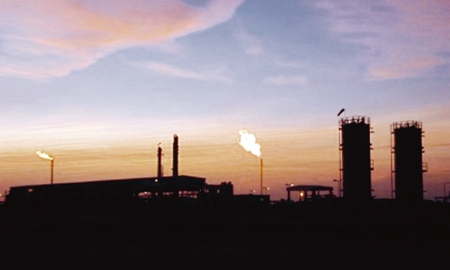“There are many reasons behind our success here, but the number one is patience. We are very patient when it comes to investing time, capital and human resources. In Oman, you have to spend more time and capital in order to develop your operations. If you don’t want to spend time on doing the necessary studies, you will not have the chance to invest the capital. And if you don’t want to invest the initial capital, then you will miss out on opportunities,” said the
CEO of Daleel Petroleum, Gong Changli.
“In my opinion, a major challenge means a major opportunity, and there are many opportunities in Oman.” Gong Changli, CEO of Daleel Petroleum |
Established in 2002 as a 50/50 joint venture between China National Petroleum Company and the Omani multinational, MB Holding, to take over the concession for Block 5, Daleel Petroleum employed horizontal water-flooding technology, successfully increasing production in the block from 4,500 barrels per day (b/d) at its onset to more than 38,000 b/d in 2012 and boosting estimated reserves from 10 million barrels in 2002 to 145 million barrels today. Now the third largest producer in the country after Petroleum Development Oman and Oxy, the company is targeting 50,000 b/d by 2015.
“Our operations can be broken down into three stages. The first was from 2002-2004, which was the study and understanding period when we were only producing to cover our costs. In 2004-2007, we had a period of stable increases. In Block 5, we have four fields, and the main one is Daleel. So in the second stage we focused on the Daleel field and drilled the first pilot well using the horizontal well technology paralleled with water-flood injectors. In the third stage from 2008 until today, we went through a period that we call the ‘jump increase’. If you look at our production charts, you will see a dramatic increase of about 20% per year during this period. In 2012, I believe we will finally be able to produce more than 13 million barrels,” said Changli. “So it all depends on your strategy. We were looking at the long-term prospects and not just short term benefits. We have been injecting water in Daleel field since 2004 and this has been the main reason of our success. In 2008, we started using this technology in all the four fields and we have had good results. In my opinion, a major challenge means a major opportunity, and there are many opportunities in Oman.”
Looking forward, Changli said the company is preparing for the tertiary phase of exploration in which it will use enhanced oil recovery techniques. So far, pilot projects have showed positive results. Next year, Daleel will launch a cutting edge 3D seismic data analysis that the CEO feels is likely to show the presence of gas as well.
“This will allow us to see what is going on in the entire block at about 3 miles below the surface. It is also very likely that we may discover tight gas, which will be a challenge for us as we are specialised in oil. So if we do find some gas, we will have to see what to do with it,” he said.

0 COMMENTS